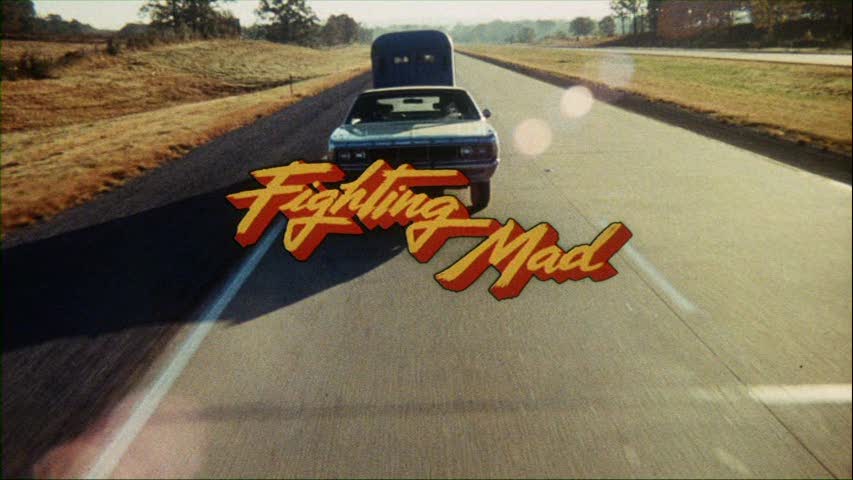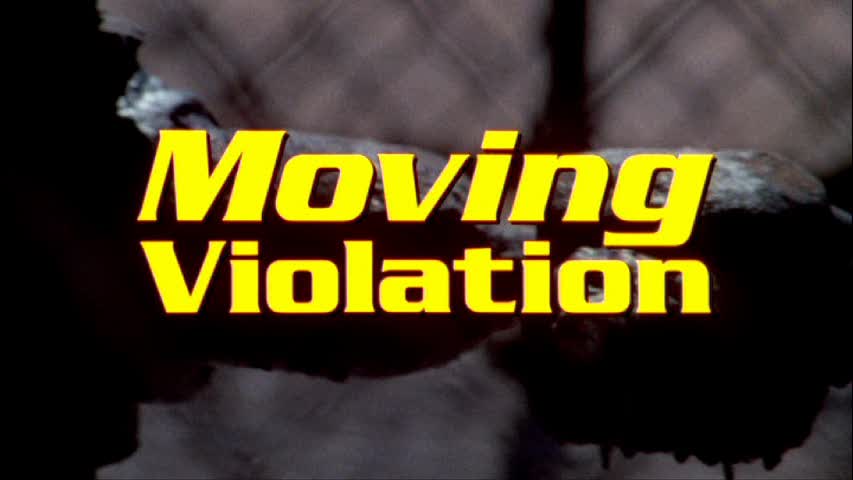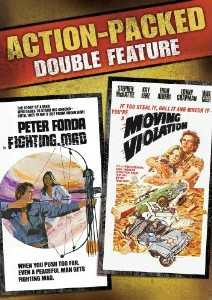

 BUY FROM AMAZON: CLICK HERE!
BUY FROM AMAZON: CLICK HERE!
STUDIO: Shout! Factory
MSRP: $11.49
RATED: R
RUNNING TIME: 181 minutes
SPECIAL FEATURES:
- Anamorphic Widescreen Transfers (1.78:1)
- Audio commentary with producer Roger Corman, director Jonathan Demme and actors Peter Fonda and Lynn Lowry
- Audio commentary with director Charles S. Dubin, producer Julie Corman, executive producer Roger Corman and actor Stephen McHattie
- Theatrical trailers and TV spots
The Pitch
An exploitation double-bill that lets you recapture the drive-in experience of yesteryear. Yee and, indeed, haw.
The Humans
Fighting Mad
Director: Jonathan Demme
Writer: Jonathan Demme
Cast: Peter Fonda, Lynn Lowry, and John Doucette.
Moving Violation
Director: Charles S. Dubin
Writers: David R. Osterhout and William Norton
Cast: Stephen McHattie, Kay Lenz, and Eddie Albert.

I love that there was a time when action heroes could look like a cross between Jonathan Pryce and Mr. Burns. I really, really do.
The Nutshell
More Corman madness from the good people at Shout! Factory. The former is a revenge thriller with Peter Fonda’s rural David taking on a corrupt industrial Goliath, while the latter is an endearing but uneven destruction derby with two kids fighting to clear their names against an evil Sheriff. Insert your own “buckle up for the ride of your life” quip here.
The Lowdown
Trailers are dying. Maybe it’s just me, but every trailer I seem to watch now uses the same template, squeezing every movie into the same noisy, pompous package. Whether it be the latest crime caper or slasher flick, the seemingly inevitable “pulse-pounding” cutting, epic crescendos, and punchlines usually get nothing but a shrug from me. I’m all for not judging a book by its cover but I want a trailer to show me something of the larger work, a flavour of what to expect, not just what makes the most exciting or marketable clip possible. In screenwriting terms, I want the trailer to be the dominant impression of that film, as though it were a character itself. Who is this guy? What’s he about? Do I know someone just like him or do I just want to?

Please drive whimsically.
Seeing a trailer is not the same as seeing the film it advertises, of course. But there’s certainly a case that today’s promos lack the character of yesteryear, making it a lot harder to get a sense of what to expect. Just look at Roger Corman; the man is to trailers what Jim Carrey is to making funny faces. Mr. New World Pictures knows just how to elevate something simple to the level of high art, even when the subject is more befitting of a bathroom stall door than the walls of the Louvre. Through sheer enthusiasm (and lots of alliteration), trailers and posters for Corman’s movies succeed on much the same level as their parent pictures, thus turning a potentially sickly blend of explosions and exclamation marks into good honest fun. There are plenty of things you could accuse Roger Corman of but dishonesty isn’t one of them.
That’s why it pains me to say there’s little about this “Action-Packed Double Feature”, both released by 20th Century Fox in 1976, that can’t be gleaned from its unremarkable packaging. The success of films like Walking Tall and Billy Jack prompted Corman to produce these “redneck revenge” B-movies; cue grand theft auto, dirt road chases, explosions, sexually liberated women, and more explosions. It’s a formula that works but the problem here is not so much the makeup as the means in which it’s applied. Fighting Mad, written and directed by Jonathan Demme, sets itself up as a straightforward modern Western, turning outlaws into shady suits and good ‘ole country folk into the de facto Lawmen, doing right by their neighbours and working hard just to get by. Tom Hunter (Fonda) comes home to his family’s Arkansas ranch with his son after separating from his wife. Back in the arms of former girlfriend Lorene (Lowry), the joys of the simple life come rushing back to him. Tom’s return is soon interrupted though by the insouciant Pierce Crabtree (Philip Carey) who’s looking to take over the Hunters’ turf. Tom’s Dad Jeff (a wonderful Doucette) says no, prompting Crabtree to introduce a bulldozer or two into the negotiation process. When Tommy’s brother Charlie (Scott Glen!) and his pregnant wife are killed by some of Crabtree’s cronies, Tom turns vigilante, waging a one man war on strip-mining. What starts off as a bit of pugilism and sabotage soon escalates into much worse though.

This is why I'd rather watch "Louisiana's Got Talent" over its British equivalent any day of the week.
Moving Violation is a typical Corman car chase yarn played straight down the middle. At least, that’s how it starts out. Wise-cracking drifter Eddie Moore (Peter Weller lookalike Stephen McHattie) and waitress Camille (Lenz) sneak onto the private grounds of shady local tycoon Rockfield (Will Geer) for a bit of fooling around, only to witness Sheriff Rankin (Chapman) blast his deputy apart for trying to blackmail him. The young couple are spotted and promptly leg it off the grounds and onto the highway with the crooked policeman and his goon-squad in pursuit. Although it shares the theme of Everymen suffering oppression at the hands of the wealthy/empowered, Moving Violation, unlike Fighting Mad, only drizzles the slightest substance over what’s essentially a Loony Tunes version of Badlands for the first hour and twenty odd minutes. Yes, Eddie and Cam are trying to foil the Sheriff’s efforts to frame them for the murder they witnessed, but that’s little more than a vehicle – pun absolutely intended – for more action. Plot and theme are supposed to take a back seat (wa-hey!) in fare like this, there’s no doubt. However, there isn’t enough spark about either the cast or the script to come up with anything special.
There are plenty of chuckles to be had across both films. If there’s a portaloo or gas station or something sitting alone in an otherwise deserted road, you can be sure a car will smash into it. That is to say, a car will sensationally fly at it just before the inevitable explosion. This is the kind of rootin’ tootin’ universe these films takes place in, where banjos ignite when there’s chaos a-brewin’. It’s certainly fun for a time, but pile-ups and almost constant obscenities lose their charm after a while, even for a Corman apologist like myself. Perhaps the greatest flaw of all isn’t the lack of originality on show (again, that’s part of the fun) but that both films make little attempt to freshen their many tropes and stereotypes the way simple genre fare must in order to distinguish itself. Fighting Mad shows signs of this kind of thing now and again. Demme’s script boasts some cute dialogue, like the back and forth between Tommy and his father (“I went night riding, Daddy./Night riding… looks like you took a mean fall.”) and Crabtree shouting at one of his goons – whom he actually refers to as goons to their faces – to stop bleeding on his car’s interior after a fight. There’s also real heart to the scenes of wholesome rural life, lent an almost idyllic beauty by Michael Watkins’ excellent photography and the gorgeous Arkansas locations. Unfortunately, the sympathetic nature of the Hunters’ cause isn’t enough to prevent a major second act lull. Peter Fonda’s transformation into a silent assassin for the finale, although inevitable, turns a charming underdog tale into a clunky if well-executed actioner.

"No time to check what that noise was. "Spartacus: Blood and Sand" starts in 5 minutes!"
Moving Violation is a very different, more playful beast, though no less hampered by the same problems. Stephen McHattie does his best James Dean, all rolled up sleeves and smart remarks, and it works in spite of any great chemistry between he and love-interest Kay Lenz. Eddie Albert has fun as the benevolent lawyer who’s the fugitives’ only friend in the world, but it’s his fate at the hands of Lonny Chapman’s Sheriff and his dimwitted underlings which unties the whole fabric of the film. The last ten minutes or so, where a light hearted chase romp descends into a bloody action thriller, doesn’t even succeed as a “so bad it’s good” shock twist. It’s tonally out of place and reeks of uncertainty over how to wrap up David R. Osterhout and William Norton’s scatter-shot script. This assemblage of Corman archetypes is barely enough to justify a film and it plays like Dubin knows it, throwing anything his meagre budget can afford at the screen in the hope of something sticking. Almost every action scene employs egregious speed-ramping in a failed attempt to energize some pretty pedestrian car chases. Worst of all though, once the cars have disengaged their warp engines, they grind to a hilarious slo-mo halt so as to pad the running time, Garth Marenghi style. Obviously these films were whipped up cheaply to wow the drive-in crowd of a different era, but even factoring the context in, it’s hard to imagine they would’ve had patrons rushing back from the concession stand for fear of missing anything.
The Package
The quality of the special features matches the films themselves. New commentaries are available for both, but it’s the one for Fighting Mad that offers the only real quality. Jonathan Demme reflects on his first major studio picture with warmth and a good sense of humour, whilst keeping the quieter Peter Fonda and Lynn Lowry from slipping out of the conversation. Moving Violation features an uncomfortably quiet commentary track. Stephen McHattie shrugs his way through scene after scene, ignoring questions from Julie Corman, until the very end when he finally offers a rather negative assessment. Each film features some wonderfully Corman trailers and TV spots (which admittedly over-emphasize their action) and nifty new anamorphic widescreen transfers.
For all their foibles, these movies remain enjoyable snapshots of their genre. Most audiences now will probably find them too quaint without all the body kits and go faster stripes of their modern equivalents – or an exotic location around which to base their shenanigans. While they may not be sophisticated or “slick”, they’re not made to be enjoyed solely on a brain-dead, “ironic” level either. There’s something to be said for popcorn films with that kind of ambition. Maybe the anti-corporate sentiment of Fighting Mad isn’t the only thing still prescient about this release.
Rating: 




Out of a Possible 5 Stars